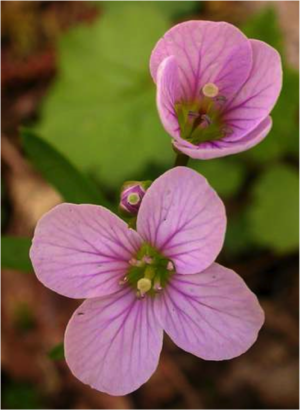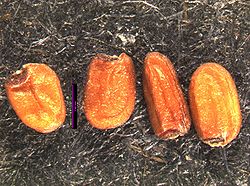Difference between revisions of "Cardamine nuttallii"
(Tag: VisualEditor) |
(→Description) (Tag: VisualEditor) |
||
| (2 intermediate revisions by the same user not shown) | |||
| Line 4: | Line 4: | ||
* Synonyms/Misapplications: ''Cardamine'' ''pulcherrima, Cardamine'' ''quercetorum, Dentaria'' ''tenella'' | * Synonyms/Misapplications: ''Cardamine'' ''pulcherrima, Cardamine'' ''quercetorum, Dentaria'' ''tenella'' | ||
* Codon: CARNUT | * Codon: CARNUT | ||
| + | ---- | ||
[[File:1-1.png |thumb| Photo by Ben Legler, 2004. Also featured on Main Page]] | [[File:1-1.png |thumb| Photo by Ben Legler, 2004. Also featured on Main Page]] | ||
=== Taxonomy === | === Taxonomy === | ||
| Line 31: | Line 32: | ||
===Description=== | ===Description=== | ||
| − | + | Perennial, rhizomatous herb with erect stems to 2 dm tall, glabrous to slightly haired.<ref name=":0" /> Basal leaves simple to 3-foliate,<ref name=":1">Flora of North America. Retrieved | |
| − | + | from http://dev.floranorthamerica.org/Cardamine_nuttallii</ref> long-petiolate, round to cordate, scalloped.<ref name=":0" /> Cauline leaves 3-foliate, 1-3.<ref name=":1" /> Inflorescences racemose, ebractate.<ref name=":2" /> Flowers regular, 4-merous; sepals 4, outer pair basally saccate;<ref name=":0" /> petals 4, pink, spatulate;<ref>Hitchcock, C. L., Cronquist, A., Giblin, D., | |
| − | + | & Legler, B. et al. (2018). ''Flora of the Pacific Northwest: an | |
| − | + | illustrated manual''. Seattle: University of Washington Press. p. 293.</ref> stamens 6, tetradynamous;<ref name=":0" /> ovary superior, becoming linear siliques to 5 cm x 1.5 mm.<ref name=":0" /> | |
===Bloom Period=== | ===Bloom Period=== | ||
| − | March-May<ref>WTU | + | March-May<ref name=":0">WTU |
Herbarium, Burke Museum, & University of Washington. Retrieved from<nowiki/>https://biology.burke.washington.edu/herbarium/imagecollection/taxon.php?Taxon=Cardamine%20nuttallii</ref> | Herbarium, Burke Museum, & University of Washington. Retrieved from<nowiki/>https://biology.burke.washington.edu/herbarium/imagecollection/taxon.php?Taxon=Cardamine%20nuttallii</ref> | ||
===Distribution=== | ===Distribution=== | ||
| − | + | British Columbia to California, chiefly west of the Cascades.<ref name=":2">WTU | |
| + | Herbarium, Burke Museum, & University of Washington. Retrieved from<nowiki/>http://biology.burke.washington.edu/herbarium/imagecollection/browse.php?Family=Brassicaceae&Classification=Vascular%20Plants&BrowseBy=Family&OrderBy=SciName&Display=Descriptions</ref> | ||
===Habitat=== | ===Habitat=== | ||
| − | + | Vernally moist forest openings and understory.<ref name=":0" /> | |
| − | = | + | |
| − | + | ||
| − | + | ||
| − | + | ||
===Seed=== | ===Seed=== | ||
[[file:Cardamine nuttallii.jpg|thumb|250px|Photo by Lisa Hintz]] | [[file:Cardamine nuttallii.jpg|thumb|250px|Photo by Lisa Hintz]] | ||
Latest revision as of 11:42, 25 June 2021
- Scientific Name: Cardamine nuttallii
- Family: Brassicaceae
- Common Names: beautiful bittercres, Nuttall's toothwort, slender toothwort
- Synonyms/Misapplications: Cardamine pulcherrima, Cardamine quercetorum, Dentaria tenella
- Codon: CARNUT
Contents
Taxonomy
| Scientific classification | |
|---|---|
| Kingdom: | Plantae |
| Subkingdom: | Viridiplantae |
| Phylum: | Tracheophyta |
| Subphylum: | Spermatophytina |
| Class: | Asterales |
| Order: | Asterales |
| Family: | Brassicaceae |
| Genus: | Cardamine L. |
| Species: | Cardamine nuttallii Greene |
| Synonyms | |
| |
Description
Perennial, rhizomatous herb with erect stems to 2 dm tall, glabrous to slightly haired.[2] Basal leaves simple to 3-foliate,[3] long-petiolate, round to cordate, scalloped.[2] Cauline leaves 3-foliate, 1-3.[3] Inflorescences racemose, ebractate.[4] Flowers regular, 4-merous; sepals 4, outer pair basally saccate;[2] petals 4, pink, spatulate;[5] stamens 6, tetradynamous;[2] ovary superior, becoming linear siliques to 5 cm x 1.5 mm.[2]
Bloom Period
March-May[2]
Distribution
British Columbia to California, chiefly west of the Cascades.[4]
Habitat
Vernally moist forest openings and understory.[2]
Seed
Seed sample from: 2007
Average Measurement: 1.75 x 1.1 x 0.7
Measurement range: L: 1.5 – 2.1, W: 1 – 1.3, D: 0.2 - 0.9
Features
Shape: Seeds a variety of shapes, mostly slightly flattened ellipses, with the hilum to opposite apex being the longest measurement. Some seeds lenticular in shape.
Additional Structures: Cotyledons accumbent with sulcus present in some.
Color: Seeds golden brown with a tan or white hilum surrounded by a darker brown color.
Surface: Seeds are deeply wrinkled or pitted. Wrinkles commonly oriented longitudinally, but not always. Seeds slightly lustrous.
Latitudinal cross section: elliptical ![]()
Longitudinal cross section: elliptical ![]()
Basic Explanations and Assumptions:
The dimensions for the seeds are length x width x depth. The location of the hilum is used as the base of the seed, and the length is measured from hilum to the opposite apex. Where a style is present, the length is measured from the hilum to the bottom of the style. Width is measured at a right angle to the length at the widest part. Depth is measured at a right angle to the intersection of height and width lines.
Measurements included are the mean average for each measurement of ten separate seeds.
All measurements in millimeters unless otherwise noted.
Photo Gallery
References
- ↑ Integrated Taxonomic Information System. Retrieved from https://www.itis.gov/servlet/SingleRpt/SingleRpt?search_topic=TSN&search_value=501196
- ↑ 2.0 2.1 2.2 2.3 2.4 2.5 2.6 WTU Herbarium, Burke Museum, & University of Washington. Retrieved fromhttps://biology.burke.washington.edu/herbarium/imagecollection/taxon.php?Taxon=Cardamine%20nuttallii
- ↑ 3.0 3.1 Flora of North America. Retrieved from http://dev.floranorthamerica.org/Cardamine_nuttallii
- ↑ 4.0 4.1 WTU Herbarium, Burke Museum, & University of Washington. Retrieved fromhttp://biology.burke.washington.edu/herbarium/imagecollection/browse.php?Family=Brassicaceae&Classification=Vascular%20Plants&BrowseBy=Family&OrderBy=SciName&Display=Descriptions
- ↑ Hitchcock, C. L., Cronquist, A., Giblin, D., & Legler, B. et al. (2018). Flora of the Pacific Northwest: an illustrated manual. Seattle: University of Washington Press. p. 293.





